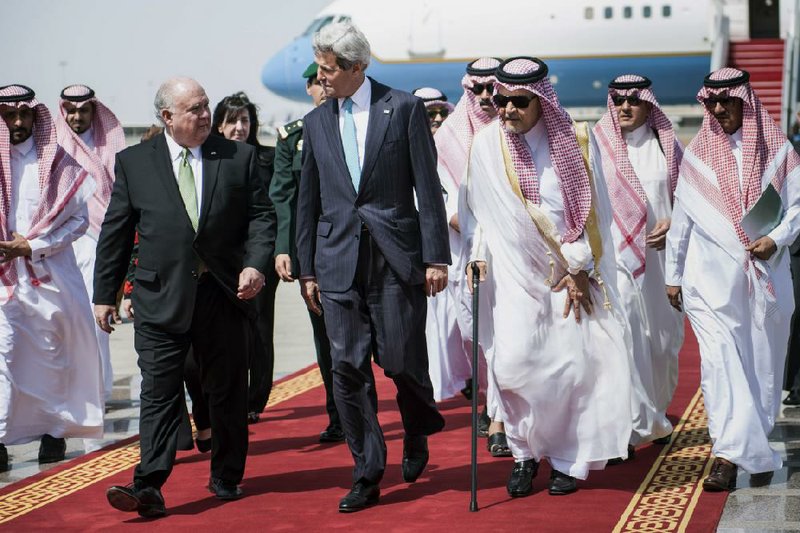BAGHDAD — Iraq’s top Shiite cleric Friday urged the country’s divided political factions to select a new prime minister by early next week, in a public call for a political solution that increases pressure on Shiite Prime Minister Nouri al-Maliki.
Speaking from the holy city of Karbala, Abdul-Mahdi al-Karbalaie, a cleric representing Grand Ayatollah Ali al-Sistani, called on Iraq’s political blocs to select a new leader before the recently elected parliament sits Monday.
Delivering the message from the grand ayatollah, he also urged the factions to select a parliamentary speaker and a president, and for the country to remain whole.
“Iraqis have passed bigger crises than this in the past history,” he said. “We must not think of dividing Iraq as part of a solution for the current crises; the solution must protect the unity of Iraq and the rights of all its sects.”
The grand ayatollah’s message came as the leader of Iraq’s semiautonomous Kurdish region, Massoud Barzani, challenged both the central government’s authority and the cleric’s wishes.
On a tour of Kirkuk, the oil-rich northern city that Kurds claim as their own, Barzani said Thursday that the city would remain in Kurdish hands. He repeated his position Friday.
Al-Maliki, for his part, did not address the grand ayatollah’s message. In a taped speech broadcast Friday afternoon, he assured viewers that the parliament would meet Monday and that Iraq’s security forces were keeping the capital secure. It was not clear whether his address had been taped before or after the grand ayatollah’s message.
Iraq has been effectively partitioned by violence since Sunni militants overran government forces in the north and west of the country earlier this month.
After Iraq’s army and police forces faltered, Kurdish forces, known as peshmerga, rushed to Kirkuk and have become the de facto authorities there, further limiting al-Maliki’s reach. Barzani has used the crisis to expand Kurdish claims.
“I am here to inform our troops to confront any attack against Kirkuk by force, and there will be no withdrawal for peshmerga from these areas anymore,” Barzani said.
“We have presented many sacrifices in the past,” he added. “Our lands have resorted to their origin identity.”
Barzani restated this position Friday in Irbil, the Kurdish capital, during an appearance with the British foreign secretary, William Hague.
The militants, led by the Islamic State of Iraq and the Levant, had controlled parts of Anbar province and also have been fighting in a Sunni area just south of Baghdad since early this year.
Human Rights Watch released a report Friday about the killings of scores of police and soldiers by the Sunni militants in the days after they captured the northern city of Mosul, then stormed south to capture Saddam Hussein’s hometown of Tikrit.
The Islamic State posted graphic online photos showing dozens of men dressed in civilian clothes lined up as militants pointed rifles at their backs. A final set of photos showed their bloodied bodies. Chief Iraqi military spokesman Lt. Gen. Qassim al-Moussawi confirmed the online photos’ authenticity June 15.
Human Rights Watch said an analysis of the photos and satellite imagery indicated that the militants killed 160 to 190 men in two locations in Tikrit between June 11-14, and the number of victims might be higher.
Meanwhile, Amnesty International said Friday that it has evidence that suggests “a pattern of extrajudicial executions” of mainly Sunni detainees by government forces and Shiite militias in Tal Afar, Mosul and Baqouba. It based its conclusions on interviews with survivors and relatives of those killed.
In recent days, Iraq’s remaining security forces, backed by Shiite volunteers and militias, have rushed to the field to block the Sunni militants from reaching Shiite-dominated areas and shrines.
On Friday, there were reports that the Iraqi army had had at least a minor success in Tikrit after a series of airstrikes and the airlifting of troops into the northern part of the city.
The forces reportedly had established positions at the Salahuddin University and at a sprawling former U.S. and Iraqi base once known as Contingency Operating Base Speicher.
Witnesses said the militants had evacuated about 50 wounded fighters from Tikrit’s main hospital and that about 100 vehicles carrying militants had left the city on their way to Hawija, a Sunni stronghold north of the city.
Meanwhile, U.S Secretary of State John Kerry arrived in Saudia Arabia on Friday as part of an attempt to enlist the support of the Saudi monarch for the formation of a multisect government in Iraq.
Kerry also met with Ahmad Assi al-Jarba, the head of the moderate Syrian opposition, at the start of his visit. That meeting came one day after the White House announced that it was seeking $500 million from Congress so the Pentagon could train and arm “vetted elements” of the Syrian opposition.
Al-Jarba, a leader of the Shammar tribe, which has branches in Saudi Arabia and Iraq, has had strong backing from the Saudis. Kerry described him as a leader who could help the United States counter the Islamic State and who may also be able to play a role in influencing Sunni leaders to help form an inclusive Iraqi government.
Information for this article was contributed by C. J. Chivers and Michael R. Gordon of The New York Times and by Ryan Lucas, Sameer N. Yacoub, Qassim Abdul-Zahra, Hamza Hendawi, Pauline Jelinek and Matthew Lee of The Associated Press.


